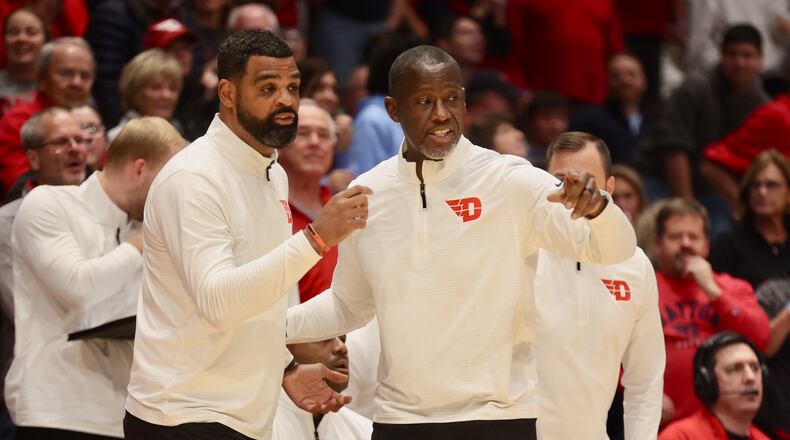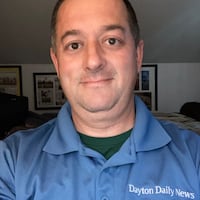The origin story of that offense dated to Grant’s days at Alabama.
“Before his final season at Alabama, Grant hired Reggie Witherspoon as an assistant in an effort to help the offense,” Bennett wrote. “Witherspoon spent 14 years as the coach at Buffalo and is credited with developing the ball-screen continuity offense. It works just like it sounds, using repeated ball screens and then maneuvering off the defensive positioning to create spacing and good looks.”
Witherspoon, who was then and is now the coach at Canisius, told Bennett in 2020 a dire situation at Buffalo forced him to find ways for his players to get open shots.
“We found something that we thought got us into a rhythm,” Witherspoon said.
Dayton found a rhythm in Grant’s third season that allowed it to rise to No. 3 in the national rankings before the pandemic derailed its postseason dreams. Five years later, the offense features many of the same elements — minus the acrobatic Toppin dunks.
Grant talked about his system at Atlantic 10 Conference Media Day in October. He said he uses the spring and early summer to binge watch games from all levels of basketball, whether they be other college games, NBA games or games in Europe, looking for new plays and new ways of playing.
“I think it evolves,” Grant said. “I’ve been around a lot of really good minds, and so you kind of take pieces that fit with things that you feel in your history, that you can teach, and you can kind of fit who you are, what you believe in. I kind of grab things from all over the place. I really try to do that every year and see where the game’s headed and how the game has evolved. It’s evolved quite a bit since I started.”
Coaching legends such as Don Donoher, Grant’s coach when he was a player at Dayton, and Billy Donovan, who won the first of two straight national championships in 2006 with Grant on his staff and later brought him onto this staff with the Oklahoma City Thunder, have influenced Grant.
Grant’s colleagues around the A-10 have sprung from many different coaching trees. They talked about the origins behind their systems and how they chose to play the way they do at Media Day.
Credit: David Jablonski
Credit: David Jablonski
Frank Martin, Massachusetts: “If you coach any sport and you don’t have a philosophy on how you want the game played, you’re probably not going to succeed. So my teams are going to be relentless. Defensively, we’re going to rebound the ball and play fast offensively. I’ve always preached that. I learned that from my high school coach (Shakey Rodriguez), who was Anthony Grant’s high school coach. We lived it as two kids. We learned it from him. You watch Anthony’s teams play, and they are relentless defensively and they rebound the basketball. Now they don’t play as fast as we do. I decided to hit the pedal a little harder than him on that one. But it’s the way we build our programs. What you do is you adapt your Xs and Os to the talent on your team. You don’t change the philosophy of how you want your team to play.”
Credit: David Jablonski
Credit: David Jablonski
Archie Miller, Rhode Island: “Growing up in high school, playing the fast-break system, playing with guys that were unselfish offensively, I was really being pushed defensively and believed in that. Then the different coaches that you work for throughout the course of your career have a dent on what you’ve done. I think obviously Sean (Miller) has a huge impression on me in terms of what he was playing in Arizona. Then me becoming a head coach, bringing that system and style of play, it’s sort of what we hang our hat on, and it’s grown from there.
“But it’s changed. I really think that it’s changed a lot here recently because your team is changing all the time. The game continues to evolve and change, so your system has to be changed. I think for me, growing up playing for a high school coach, my dad, playing in college, and then moving on in the ranks, it’s always been about the fast-break system. It’s always been about unselfish play. It’s been about skill, having great point guard play.
“Defensively, it’s always been about being the toughest, rustiest nail you can be. For the most part, I think that’s probably where my system comes from. I also feel like when you do have your own program and you have trials and experiences along the way, you find out who you are. I would think that our style of play here at Rhode island has been a mosh because we’ve been a mosh of bodies. Hopefully, this year we can find a style.”
Credit: David Jablonski
Credit: David Jablonski
Keith Urgo, Fordham: “I coached for Jay Wright at Villanova, and we took a lot (of his system) to Penn State. Obviously, when I came to Fordham, it was with the Villanova associate head coach at the time, Kyle Neptune. Bringing that incredible, positive attitude and the energy, we talk about that a lot. Outside of just scoring points — the dives, the charges — anybody who plays Fordham knows that it’s going to be a dogfight. We’re really in almost every game because of the fight and because of the way we play together and how hard we play. Now you add to that some depth and some experience this year. If they can play the same hard-nosed way and understand how we’re going to compete in the Atlantic 10, along with some high level scorers that we now have on our roster, we’ve got a chance to compete every night.”
Credit: David Jablonski
Credit: David Jablonski
Matt McKillop, Davidson: “I know my dad (his predecessor Bob McKillop) was a big fan or a big studier of Bob Knight and the motion offense. I think that’s what he wanted to do. He was a high school coach, but then obviously became a college coach. But then I also think he had to figure out who he could recruit to Davidson College, who was going to choose Davidson when they were very, very unsuccessful in the Southern Conference. Who could get admitted into Davidson? I think he had to figure out who would sign up to play for Davidson. And then he structured a system based on the talent and skill sets of the players that he could recruit. Obviously, you adjust year after year based on who your personnel is, but I think what we do is very much based on the system that he created for Davidson.
“One of the greatest gifts, if you will, that he gave to me was he allowed me to take some control of our offense in his last two years as head coach. We started playing a little differently, especially with Foster Loyer and Luka Brajkovic and Mike Jones and Hyunjung Lee. We kind of broke away from our traditional system at times, and for that particular team, it was very effective. I guess since I’ve been head coach, there’s been a little bit of a blend. Unfortunately, we haven’t shot the ball well enough to make that look as pretty as we believe it should, but I think this year’s team can make that look a little different.”
Credit: David Jablonski
Credit: David Jablonski
Josh Schertz, Saint Louis: “I think one thing with systems is the game evolves. You have to evolve with the game. So what maybe is good now probably wouldn’t be good a couple of years from now, and what we did three or four years ago wouldn’t be as effective as it is today. You have to think of things, though, systematically, in how you want to play. But I also think you’ve got to be adaptable to your personnel. You can’t fit square pegs into round holes. So do you have non-negotiables? Do you have things that say, ‘Man, we certainly want this to be a part of how we play?’ Like we want to be really unselfish. We want to play really fast. Or we want to have great paint pressure. Or whatever the case may be. And then how you get there might be a little bit different each year. So I think for me, it went back to going to watch Brad Stevens in training camp in 2015. That really changed the way I saw the game. I saw offense become much less patterns, much more rhythm, kind of like jazz — improvisational versus structured. That’s just evolved and adapted every year since then, but 2015 was really where that changed.”
Credit: David Jablonski
Credit: David Jablonski
Drew Valentine, Loyola Chicago: “One of the biggest things you can have as a program is identity. The best programs in the country are the ones with distinct identities. I thought that was one of the biggest differences between this conference and the Missouri Valley Conference. Those coaches recruited to those styles. The MVC was all about being a chameleon. Here it’s like when you play Richmond, you know what you’re getting. For us, it’s physicality and versatility defensively, and then offensively, we want to play with full-court pace. We want to have a bunch of different options and be a team that really shares the ball. That’s why we didn’t have a first-team all-league guy last year, even winning the league. We were the No. 1 defense in the league, and then we didn’t have a guy average more than 13 a game. That’s when we were good last year. We fit that identity perfectly.
“I think I’ve taken something from everybody. I think the defense is coach (Tom) Izzo. We’re trying to be physical, trying to be a bully. I would say the sharing-the-ball piece is a lot of coach (Porter) Moser, and his spacing comes from Rick Majerus. We’re really focusing on space and teaching guys how to play. That pace is from Greg Kampe, who I played for at Oakland.”
Anthony Grant’s offense by the numbers
Highest scoring: 80.0 points per game (2019-20).
Lowest scoring: 68.6 (2022-23).
Best 3-point shooting: 39.9 (2023-24).
Worst 3-point shooting: 33.2 (2018-19).
Best 2-point shooting: 62.3 (2019-20).
Worst 2-point shooting: 53.4 (2022-23).
Best free-throw shooting: 74.0 (2023-24).
Worst free-throw shooting: 68.3 (2021-22).
A-10 coaches ranked by seniority
Twentieth season: Chris Mooney, Richmond.
Eighteenth season: Mark Schmidt, St. Bonaventure.
Eighth season: Anthony Grant, Dayton.
Sixth season: Billy Lange, Saint Joseph’s.
Fourth season: Drew Valentine, Loyola Chicago.
Third season: Matt McKillop, Davidson; Frank Martin, Massachusetts; Archie Miller, Rhode Island; Fran Dunphy, La Salle; Chris Caputo, George Washington; and Keith Urgo, Fordham.
Second season: Tony Skinn, George Mason; and Ryan Odom, Virginia Commonwealth.
First season: Josh Schertz, Saint Louis; and Dru Joyce III, Duquesne.
About the Author







